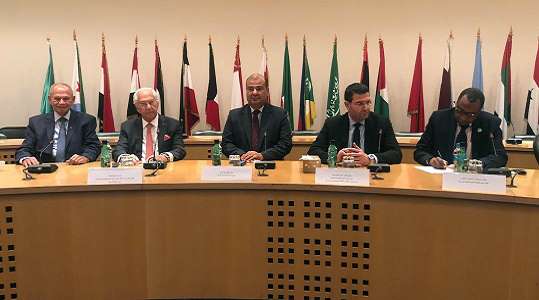The Secretary-General of the Union of Arab Chambers, Dr. Khaled Hanafi, during a meeting held by the Arab Organization for Agricultural Development on October 12 at the headquarters of the Union of Arab Chambers in Beirut, to discuss mechanisms for implementing the Arab League’s initiative to support the agricultural season in Sudan, confirmed that “holding the meeting in Beirut confirms that Lebanon is still an incubator for Arabs and Arab issues,” considering that “hosting the meeting by the Union of Arab Chambers confirms the role it has played since its founding in terms of embracing Arab development initiatives and issues.”
A number of Arab agricultural ministers participated in the meeting, led by the Minister of Agriculture of the Lebanese Republic, Abbas Al-Haj Hassan, and a number of representatives of Arab organizations, funds and bodies, and Sudanese and Arab investors. Via Zoom technology, the Sudanese Minister of Agriculture and the Governor of the Al-Jazeera Project participated. From the office of the Arab Organization for Agricultural Development in Cairo, a number of Sudanese businessmen participated, and a number of other businessmen participated via Zoom technology.
The Secretary-General of the Union believed that “if Sudan recovers agriculturally, this would solve and address the issues of Arab food security, because of the enormous capabilities that Sudan has, whether in terms of vast arable lands or in terms of the large livestock that it possesses, which requires Sudan’s support, which is considered the Arab food basket.” He stressed that "the time has come to open the doors to the Arab private sector, which is considered the largest contributor in terms of employment and job creation, or in terms of contribution to the gross domestic product," pointing out that "there are combined Arab energies that can bring about the desired change."
He said: "Agricultural resources must be exploited more, efficiency must be used and public interest must be secured, in addition to the use of modern technology, whether in irrigation or agriculture."
He stressed "the necessity of following a business model that stimulates producers and enhances the reality of supply chains between Arab countries, all the way to the consumer." He considered that "the business model was neglected in the past, and this today calls for giving a greater role to the Arab private sector by harmonizing the interest of the farmer in his community, leading to networking among farmers in the rest of the Arab region."
He noted, "Paying attention to the added value of the product will lead to improving the types of Arab products, which will enhance the competitiveness of Arab products compared to other products from countries of the world, and at the same time contribute to enhancing the reality of Arab food security."
At the beginning of the meeting, Professor Ibrahim Al-Dakhiri indicated that the aim of the meeting is to establish emergency support mechanisms for the agricultural season in Sudan through grants, detailed loans, contract farming, commodity exchange, or any other agreed-upon formulas.
As for the Sudanese Minister of Agriculture, Abu Bakr Omar Al-Bushra, he indicated that during the summer season, 36 million acres were planted, and the focus was on food security crops, corn and millet, and the crops have now reached the harvest stage. He added that the Agricultural Bank, as a specialized body, reported that the needs for emergency support for the harvest, including petroleum materials, burlap, etc., are in the range of 35 billion Sudanese pounds, equivalent to about 40 million dollars. While the winter season’s needs for petroleum materials, improved seeds, fertilizers of both types, preparation, and harvesting processes are in the range of 315 billion Sudanese pounds, equivalent to 360 million dollars. He pointed out that the Ministry of Finance and the Agricultural Bank are ready to provide guarantees to financing parties.
Zakaria Hammoud delivered a speech at the Union of Arab Banks, on behalf of the Union’s Secretary, Wissam Fattouh, in which he considered that “investing in Sudan’s agricultural wealth does not only constitute the true gateway to Sudan’s advancement but rather the greatest gateway towards achieving Arab food security. Today, this food security is threatened by the conditions and circumstances that Sudan is going through, as well as by global developments, the Russian-Ukrainian war, and the disruption of supply chains.”
He called for developing an emergency response plan to support Sudan to save the agricultural season and remove the danger of hunger from the Sudanese, stressing that “the Union of Arab Banks is using all its capabilities to implement the emergency plan to support Sudan.” Pointing out that "the Sudanese banking sector must be neutralized from the ongoing conflict in Sudan, in order to coordinate with it to accelerate the implementation of the emergency plan."
Source (Union of Arab Chambers)

